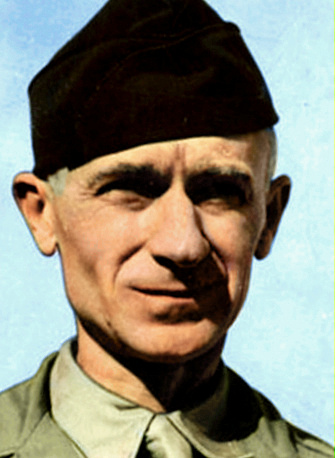Roving Reporter
By Ernie Pyle
IN THE MARIANAS ISLANDS (delayed) – In my long career with the United States Army, I’ve made a hobby of cultivating the very best people in it. And for some strange reason, the very best people usually turn out to work in the kitchen. Isn’t that odd?
My latest acquisitions are a Mutt & Jeff team known as Mickey and Bill. They serve the food in our mess hall. They have to work like dogs and they dash around in such intent haste that you think they are mad at everybody all the time.
But they aren’t. That’s just a look of concentration on their faces. Whenever we give them time to relax, they’re the best-natured pair you ever saw.
These two boys are Sgt. Thomas Bill of St. Louis, and Cpl. Mickey Rovinsky of Edwardsville [Luzerne County], Pennsylvania. They’re as different as day and night, but they work together like cogs in a gearwheel.
Sgt. Bill is tall and thin and white-skinned and has curly black hair and a sensitive face, and he doesn’t say much. Mickey is so short he could stand under Bill’s arm, and his skin is dark. His eyes are almost shut and he talks all the time – and such talk.
Mickey is unquotable, because you couldn’t possibly remember things the way he says them. His colloquialisms are not sectional, they’re pure Rovinsky.
Special favorite
The boys’ special favorite among all the fliers is my friend Capt. Bill Gifford. He’s always giving them things, and sits up and talks with them in the mess hall after supper, and as a result they’d stay up all night for him if he merely suggested it.
By good fortune, I fell in with this trio, and every night Giff and I would stay away from supper until everybody else had finished and the two boys had their tables all cleaned up and set for breakfast.
Then we’d wander over through the dark and the four of us would have a banquet – such as steak and French-fried potatoes. The boys would cook it and then we’d all sit down and eat, and the talk would start to fly.
The first Tokyo mission was a highlight in Mickey’s life. The pilots are always tense the night before a mission, and Mickey has his troubles.
Mickey says:
They took off six times for Tokyo. I mean they was scheduled to go every day for six days, and they’d all be short-tempered and wanting things just go at night, and then next morning the mission would be postponed.
It was their first mission up there and they’d heard a rumor there was to be 1,300 Jap fighters lined up across the sky just like a wall, and they was nervous and grumpy.
Like Capt. Gifford here, I can always tell when he’s going the next day. He don’t say much at supper like he usually does. He just wants that sharp attention and keep your mouth shut and leave him the hell alone.
Tense and worried
Well, them pilots was tense and worried and they didn’t drink any beer or anything for five nights and then finally on the sixth night they was up half the night yellin’ around, and then next morning they really did take off. Boy, they didn’t feel good either.
It’s a good thing they finally went or I was gonna mutiny. I got sick and tired of puttin’ grub in them damned airplanes. I was gonna refuse the seventh time. I said I’d take a court-martial before I’d put grub in them planes a seventh time. But they went that time.
Then Capt. Gifford took up.
You should have been here that morning. The mission was called so fast there wasn’t time to warm up the engines a few at a time, so they ran them all up at once all over the field. This whole island shook from the vibration.
When I took off, I had to weave around through bulldozers and between jeeps and across cane patches and I kept thinking about those 1,300 fighters we’d heard about. I sure was put out about ever getting into this business in the first place. But it turned out all right.
“When Capt. Gifford gets back,” Mickey went on, “he’s a changed man. He’s still full of nerves but he wants to talk and he wants me to keep the beer comin’ out of the icebox.”
Sgt. Bill sits and listens and smiles and enjoys it and says almost nothing. He and Mickey are both married men, although they’re only 24 and 23 respectively.
The boys have to get up at 5 a m. and their work isn’t finished till about 9 at night. They don’t even get to go to the movies, for they don’t get through work in time. But they don’t seem to care. They feel they’re pretty lucky to have things as nice as they are.
The day I was to leave, they gave me what Mickey called my “farewell breakfast” – three fried eggs! There’s nothing in this Army like knowing the very best people.
